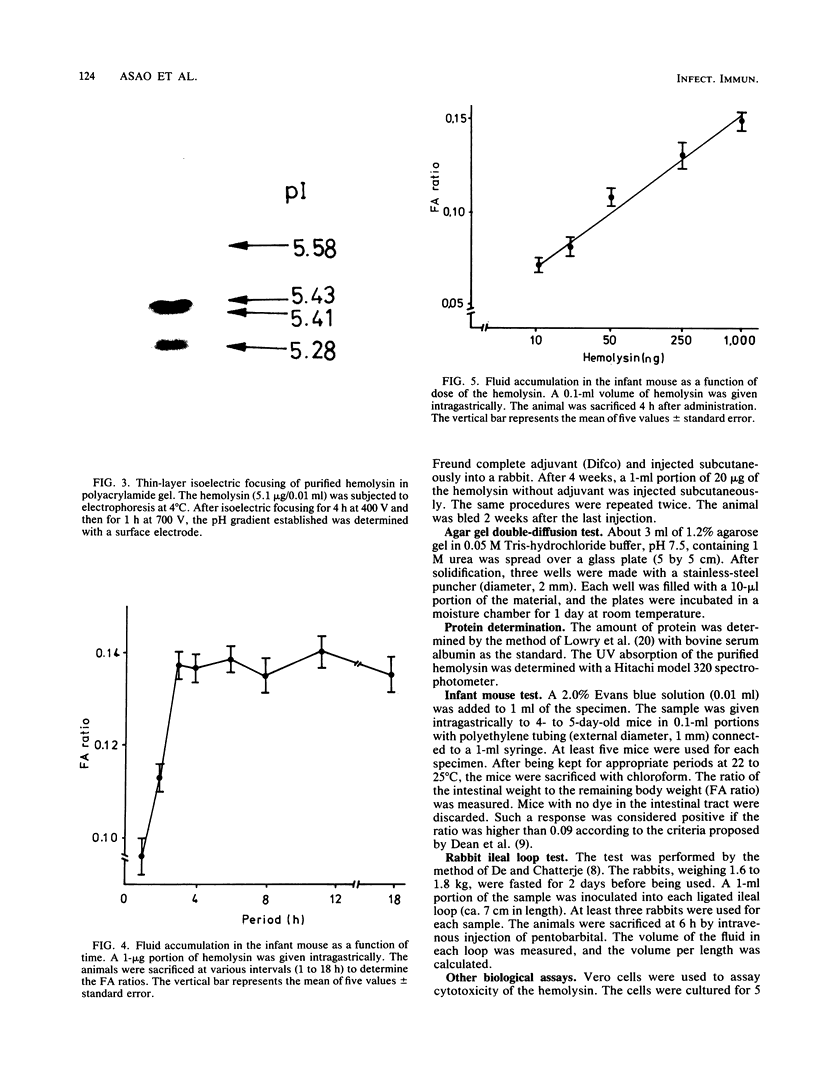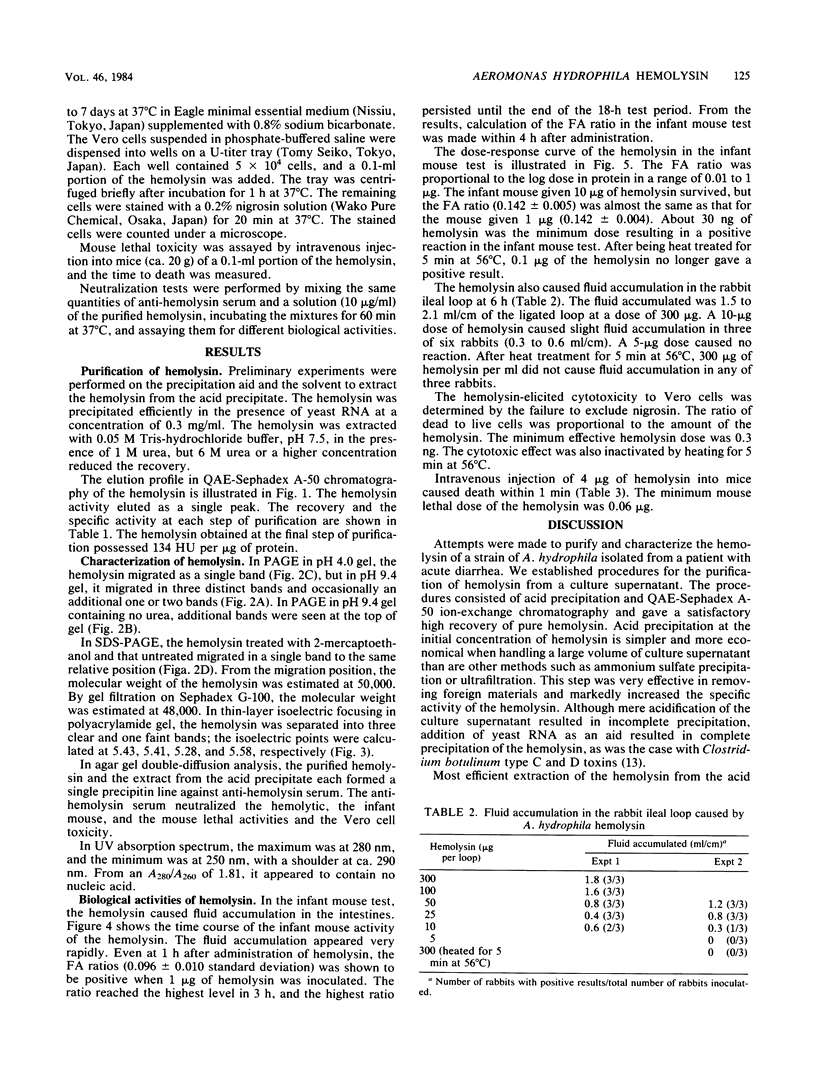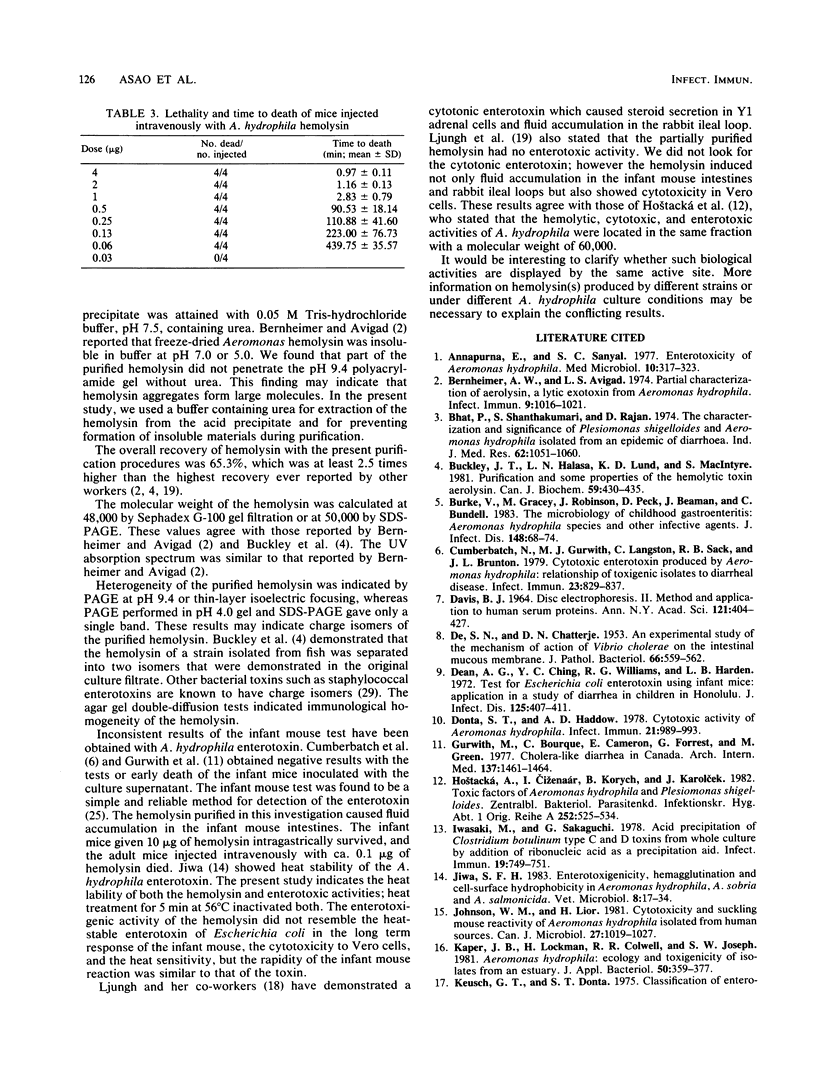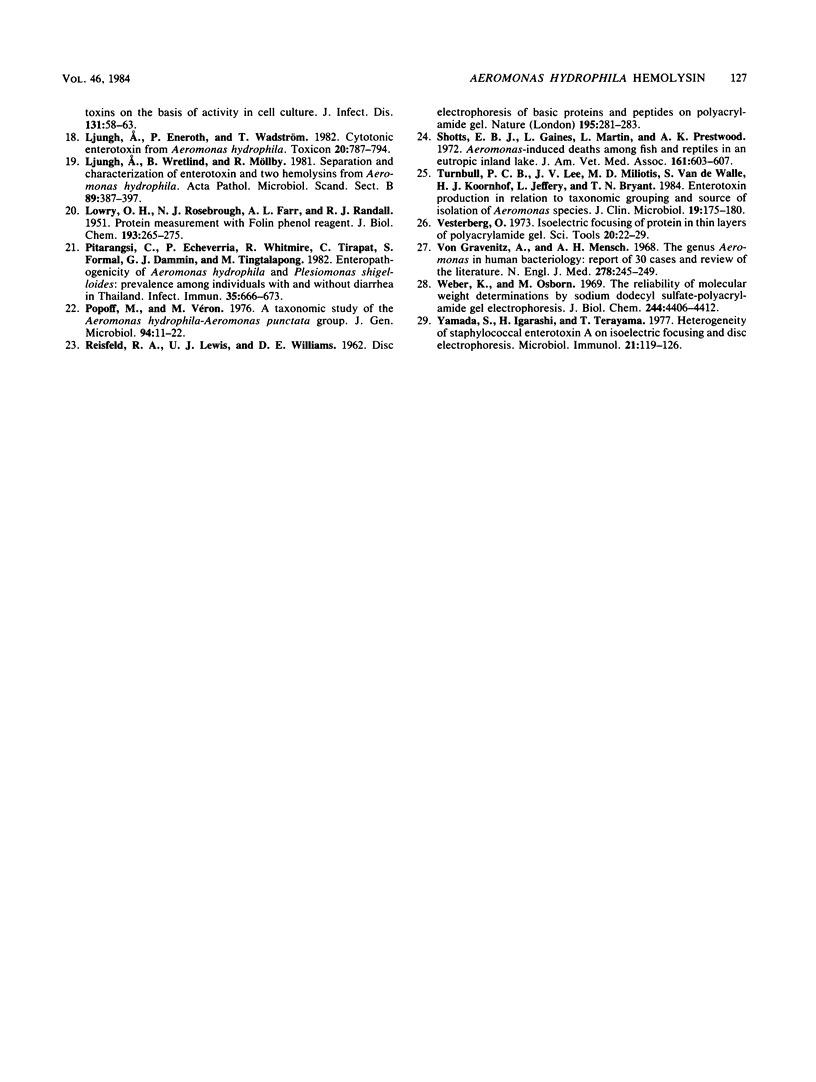Abstract
A hemolysin produced by a strain of Aeromonas hydrophila isolated from a patient with diarrhea was purified by acid precipitation and quarternary aminoethyl-Sephadex chromatography. The molecular weight of the hemolysin was estimated at 50,000 by sodium dodecyl sulfate-polyacrylamide gel electrophoresis and at 48,000 by Sephadex G-100 gel filtration. In polyacrylamide gel electrophoresis at pH 4.0 and sodium dodecyl sulfate-polyacrylamide gel electrophoresis, the hemolysin migrated as a single band, whereas electrophoresis at pH 9.4 and thin-layer isoelectric focusing demonstrated multiple bands. The results may indicate charge isomers of the hemolysin. The purified hemolysin had a hemolytic activity of 134 hemolytic units per microgram of protein on rabbit erythrocytes. It caused fluid accumulation in infant mouse intestines and rabbit ligated ileal loops. Purified hemolysin also elicited cytotoxicity to Vero cells and lethal toxicity to mice. All these biological activities were lost on heating for 5 min at 56 degrees C. These findings support the notion that A. hydrophila hemolysin is a cytotoxic enterotoxin.
Full text
PDF





Images in this article
Selected References
These references are in PubMed. This may not be the complete list of references from this article.
- Annapurna E., Sanyal S. C. Enterotoxicity of Aeromonas hydrophila. J Med Microbiol. 1977 Aug;10(3):317–323. doi: 10.1099/00222615-10-3-317. [DOI] [PubMed] [Google Scholar]
- Bernheimer A. W., Avigad L. S. Partial characterization of aerolysin, a lytic exotoxin from Aeromonas hydrophila. Infect Immun. 1974 Jun;9(6):1016–1021. doi: 10.1128/iai.9.6.1016-1021.1974. [DOI] [PMC free article] [PubMed] [Google Scholar]
- Bhat P., Shanthakumari S., Rajan D. The characterization and significance of Plesiomonas shigelloides and Aeromonas hydrophila isolated from an epidemic of diarrhoea. Indian J Med Res. 1974 Jul;62(7):1051–1060. [PubMed] [Google Scholar]
- Buckley J. T., Halasa L. N., Lund K. D., MacIntyre S. Purification and some properties of the hemolytic toxin aerolysin. Can J Biochem. 1981 Jun;59(6):430–435. doi: 10.1139/o81-059. [DOI] [PubMed] [Google Scholar]
- Burke V., Gracey M., Robinson J., Peck D., Beaman J., Bundell C. The microbiology of childhood gastroenteritis: Aeromonas species and other infective agents. J Infect Dis. 1983 Jul;148(1):68–74. doi: 10.1093/infdis/148.1.68. [DOI] [PubMed] [Google Scholar]
- Cumberbatch N., Gurwith M. J., Langston C., Sack R. B., Brunton J. L. Cytotoxic enterotoxin produced by Aeromonas hydrophila: relationship of toxigenic isolates to diarrheal disease. Infect Immun. 1979 Mar;23(3):829–837. doi: 10.1128/iai.23.3.829-837.1979. [DOI] [PMC free article] [PubMed] [Google Scholar]
- DAVIS B. J. DISC ELECTROPHORESIS. II. METHOD AND APPLICATION TO HUMAN SERUM PROTEINS. Ann N Y Acad Sci. 1964 Dec 28;121:404–427. doi: 10.1111/j.1749-6632.1964.tb14213.x. [DOI] [PubMed] [Google Scholar]
- DE S. N., CHATTERJE D. N. An experimental study of the mechanism of action of Vibriod cholerae on the intestinal mucous membrane. J Pathol Bacteriol. 1953 Oct;66(2):559–562. doi: 10.1002/path.1700660228. [DOI] [PubMed] [Google Scholar]
- Dean A. G., Ching Y. C., Williams R. G., Harden L. B. Test for Escherichia coli enterotoxin using infant mice: application in a study of diarrhea in children in Honolulu. J Infect Dis. 1972 Apr;125(4):407–411. doi: 10.1093/infdis/125.4.407. [DOI] [PubMed] [Google Scholar]
- Donta S. T., Haddow A. D. Cytotoxic activity of Aeromonas hydrophila. Infect Immun. 1978 Sep;21(3):989–993. doi: 10.1128/iai.21.3.989-993.1978. [DOI] [PMC free article] [PubMed] [Google Scholar]
- Gurwith M., Bourque C., Cameron E., Forrest G., Green M. Cholera-like diarrhea in Canada. Report of a case associated with enterotoxigenic Escherichia coli and a toxin-producing Aeromonas hydrophila. Arch Intern Med. 1977 Oct;137(10):1461–1464. doi: 10.1001/archinte.137.10.1461. [DOI] [PubMed] [Google Scholar]
- Hostacká A., Ciznár I., Korych B., Karolcek J. Toxic factors of Aeromonas hydrophila and Plesiomonas shigelloides. Zentralbl Bakteriol Mikrobiol Hyg A. 1982 Sep;252(4):525–534. [PubMed] [Google Scholar]
- Iwasaki M., Sakaguchi G. Acid precipitation of Clostridium botulinum type C and D toxins from whole culture by addition of ribonucleic acid as a precipitation aid. Infect Immun. 1978 Feb;19(2):749–751. doi: 10.1128/iai.19.2.749-751.1978. [DOI] [PMC free article] [PubMed] [Google Scholar]
- Jiwa S. F. Enterotoxigenicity, hemagglutination and cell-surface hydrophobicity in Aeromonas hydrophila, A. sobria and A. salmonicida. Vet Microbiol. 1983 Feb;8(1):17–34. doi: 10.1016/0378-1135(83)90016-0. [DOI] [PubMed] [Google Scholar]
- Johnson W. M., Lior H. Cytotoxicity and suckling mouse reactivity of Aeromonas hydrophila isolated from human sources. Can J Microbiol. 1981 Oct;27(10):1019–1027. doi: 10.1139/m81-159. [DOI] [PubMed] [Google Scholar]
- Kaper J. B., Lockman H., Colwell R. R., Joseph S. W. Aeromonas hydrophila: ecology and toxigenicity of isolates from an estuary. J Appl Bacteriol. 1981 Apr;50(2):359–377. doi: 10.1111/j.1365-2672.1981.tb00900.x. [DOI] [PubMed] [Google Scholar]
- Keusch G. T., Donta S. T. Classification of enterotoxins on the basis of activity in cell culture. J Infect Dis. 1975 Jan;131(1):58–63. doi: 10.1093/infdis/131.1.58. [DOI] [PubMed] [Google Scholar]
- LOWRY O. H., ROSEBROUGH N. J., FARR A. L., RANDALL R. J. Protein measurement with the Folin phenol reagent. J Biol Chem. 1951 Nov;193(1):265–275. [PubMed] [Google Scholar]
- Ljungh A., Eneroth P., Wadström T. Cytotonic enterotoxin from Aeromonas hydrophila. Toxicon. 1982;20(4):787–794. doi: 10.1016/0041-0101(82)90126-x. [DOI] [PubMed] [Google Scholar]
- Ljungh A., Wretlind B., Möllby R. Separation and characterization of enterotoxin and two haemolysins from Aeromonas hydrophila. Acta Pathol Microbiol Scand B. 1981 Dec;89(6):387–397. doi: 10.1111/j.1699-0463.1981.tb00205_89b.x. [DOI] [PubMed] [Google Scholar]
- Pitarangsi C., Echeverria P., Whitmire R., Tirapat C., Formal S., Dammin G. J., Tingtalapong M. Enteropathogenicity of Aeromonas hydrophila and Plesiomonas shigelloides: prevalence among individuals with and without diarrhea in Thailand. Infect Immun. 1982 Feb;35(2):666–673. doi: 10.1128/iai.35.2.666-673.1982. [DOI] [PMC free article] [PubMed] [Google Scholar]
- Popoff M., Véron M. A taxonomic study of the Aeromonas hydrophila-Aeromonas punctata group. J Gen Microbiol. 1976 May;94(1):11–22. doi: 10.1099/00221287-94-1-11. [DOI] [PubMed] [Google Scholar]
- REISFELD R. A., LEWIS U. J., WILLIAMS D. E. Disk electrophoresis of basic proteins and peptides on polyacrylamide gels. Nature. 1962 Jul 21;195:281–283. doi: 10.1038/195281a0. [DOI] [PubMed] [Google Scholar]
- Shotts E. B., Jr, Gaines J. L., Jr, Martin L., Prestwood A. K. Aeromonas-induced deaths among fish and reptiles in an eutrophic inland lake. J Am Vet Med Assoc. 1972 Sep 15;161(6):603–607. [PubMed] [Google Scholar]
- Turnbull P. C., Lee J. V., Miliotis M. D., Van de Walle S., Koornhof H. J., Jeffery L., Bryant T. N. Enterotoxin production in relation to taxonomic grouping and source of isolation of Aeromonas species. J Clin Microbiol. 1984 Feb;19(2):175–180. doi: 10.1128/jcm.19.2.175-180.1984. [DOI] [PMC free article] [PubMed] [Google Scholar]
- Von Graevenitz A., Mensch A. H. The genus aeromonas in human bacteriology report of 30 cases and review of the literature. N Engl J Med. 1968 Feb 1;278(5):245–249. doi: 10.1056/NEJM196802012780504. [DOI] [PubMed] [Google Scholar]
- Weber K., Osborn M. The reliability of molecular weight determinations by dodecyl sulfate-polyacrylamide gel electrophoresis. J Biol Chem. 1969 Aug 25;244(16):4406–4412. [PubMed] [Google Scholar]
- Yamada S., Igarashi H., Terayama T. Heterogeneity of staphylococcal enterotoxin A on isoelectric focusing and disc electrophoresis. Microbiol Immunol. 1977;21(3):119–126. doi: 10.1111/j.1348-0421.1977.tb00273.x. [DOI] [PubMed] [Google Scholar]




